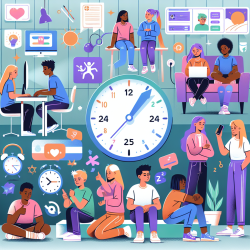Empowering Practitioners: Harnessing the Influence of Local Interest Groups
In the realm of local politics, interest groups play a pivotal role in shaping policies and influencing outcomes that affect our daily lives. From real estate developers to teachers' unions, these groups are actively engaged in advocating for their interests at the local level. For practitioners in the field of special education and online therapy services, understanding the dynamics of these groups can be a powerful tool for enhancing advocacy efforts and improving service delivery.
Understanding the Landscape of Local Interest Groups
The research article "Interest groups in US local politics: Introduction to the special issue" highlights the often-overlooked role of interest groups in local politics. While much of the scholarly focus has been on national politics, this special issue brings attention to the diverse array of interest groups active in American cities, counties, and school districts. These groups, including tenant organizations, teachers' unions, and local political action committees (PACs), are instrumental in shaping local policies on housing, education, policing, and more.
Strategies for Practitioners
For practitioners, especially those involved in online therapy services like TinyEYE, there are several strategies to consider when engaging with local interest groups:
- Build Alliances: Identify interest groups that align with your goals and collaborate with them to amplify your advocacy efforts. For example, partnering with teachers' unions can enhance support for educational initiatives.
- Engage in Public Hearings: Attend local government meetings and public hearings to voice your concerns and support policies that benefit your community. Interest groups often have a strong presence at these events, and joining forces can strengthen your position.
- Leverage Endorsements: Seek endorsements from influential local groups to gain credibility and support for your initiatives. As highlighted in the research, endorsements can significantly impact election outcomes and policy decisions.
- Stay Informed: Keep abreast of local political developments and interest group activities. Understanding the political landscape will enable you to anticipate challenges and opportunities in your advocacy efforts.
Encouraging Further Research
The special issue also emphasizes the need for further research on local interest groups. By exploring the nuanced ways these groups operate and influence local politics, practitioners can develop more effective strategies for advocacy and policy change. Engaging in research collaborations with academic institutions or conducting independent studies can provide valuable insights into the dynamics of local interest groups.
Conclusion
Interest groups are a formidable force in local politics, and their influence extends to various aspects of community life, including education and therapy services. By understanding and engaging with these groups, practitioners can enhance their advocacy efforts and contribute to positive change in their communities. To delve deeper into the research on local interest groups, practitioners are encouraged to explore the original research paper, Interest groups in US local politics: Introduction to the special issue.










